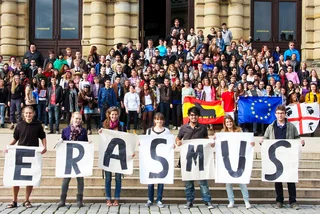More and more foreign students are choosing Czechia to pursue higher education, though experts say the country must do more to attract and retain international students. According to last week’s Conference on International Students in Czechia, this will ultimately benefit both Czechia's economy and education sector.
Organized in cooperation with the Council of Higher Education Institutions, Charles University, Anglo-American University in Prague, and the Czech National Agency for International Education and Research, the event sought to address how foreign students and graduates can help transform “Czechia into a knowledge-based economy” and counteract demographic decline.
Students from all over the world
There are currently around 56,000 international students comprising nearly 18 percent of the total student population in the country. This, according to director of Czech National Agency for International Education and Research Michal Uhl, makes Czechia “among Europe’s more internationalized education destinations.”
The majority of foreign students in Czechia are Slovaks, followed by students from Ukraine, Russia, Kazakhstan, and India. Data shows that the majority of foreign students study business, administration, and law. The least-frequently studied degrees were in education faculties as well as in agriculture and veterinary-related subjects.
Foreign students made up about 27 percent of the students in doctoral programs, 20 percent in master's programs, and 16 percent in bachelor's programs last year.

A huge boost to the economy
“International students bring immense value—not only by enriching the education system with a global perspective but also by contributing billions of crowns annually to the economy. They also provide a highly skilled workforce for our labor market,” Uhl added last week.
According to the conference, foreign students contribute CZK 17 billion annually to the country’s economy. They also create around 6,000 jobs in the country while helping to plug gaps in the country's labor force: OECD data shows that Czechia lacks 600,000 university graduates for work.
"Forty-five percent of foreign graduates choose to stay in Czechia after their studies to work," Uhl stated. "And almost half of the students in the survey expressed a desire to remain in the Czech Republic and enter the labor market or continue their studies," he said.
Life could be easier for foreign students
Despite the benefits that foreign students bring, they also face significant challenges in Czechia, including complex visa procedures, limited scholarship opportunities, and integration barriers—particularly with language.
Malvína Krausz Hladká, vice dean for student affairs at Charles University’s social sciences faculty, also pointed out that “the majority of the world is used to a centralized university admissions system…in Czechia, it is decentralized, which can complicate access to higher education in Czechia.”
“We understand the challenges of studying far from home, which is why we need to provide comprehensive support to help them succeed,” said Milena Králíčková, Rector of Charles University. Králíčková said that universities should invest more in integration programs to help students settle into daily Czech life (such as registering at a doctor’s office or dealing with paperwork).
Although more foreigners are coming to Czechia to study, other Central and East European countries are doing a better job of attracting students.
While the number of international students coming to study in Czechia grew by 20 percent in recent years, in Central and Eastern Europe the number grew by 48 percent. Part of the reason, speakers say, is because Czechia does not have a national scholarship program, unlike Hungary for example.
Government ministries are actively discussing potential policy improvements to address these concerns. Jaroslav Miller, Deputy Minister at the Ministry of Education, Youth, and Sports, emphasized the importance of inter-ministerial cooperation: “Overcoming these challenges requires close collaboration. Investing in international students and graduates will pay off multiple times in the future.”












 Reading time: 3 minutes
Reading time: 3 minutes 




















